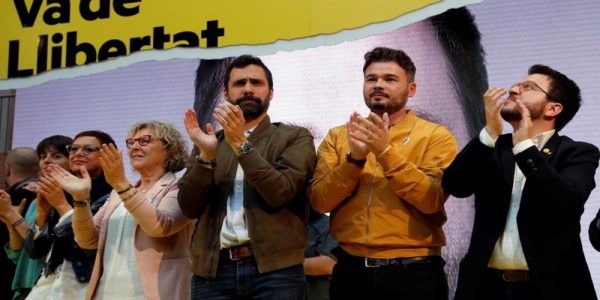
A triumph of ERC with a double effect: they defeated the unionists and beat their competitors for the Catalan leadership. We published a first assessment of the elections in the Spanish State, the “defeat of the trio of Colón”. However, due to its importance, it is necessary to focus on the Catalan result.
There was a record participation of 75.7%, with ERC winning with 15 seats, with the support of the Soberanistas that split from En Comú Podem. The PSC got 350,000 votes, rose to 12 representatives and displaced En Comú Podem. It was an historic event: it is the first time that a pro-independence party triumphs in the general elections, in this case led by Oriol Junqueras from the Soto del Real prison, who erased the “red lines” of negotiation with the PSOE before the beginning of the campaign.
If Pedro Sánchez opts for an alliance with Podemos, in the second round, an abstention of the ERC would be enough for him to win. Esquerra, on this occasion publicly led by current deputy Gabriel Rufián, has risen to the leadership of the independence movement. In the absence of a revolutionary political leadership with mass influence, the people decided to massively attend the polls and use Esquerra as a tool to concentrate their votes.
ERC´s competitor, JxCat, promoted by former president Carles Puigdemont, won 7 seats, one less than in 2016, with a list made up of political prisoners like Jordi Sánchez, Josep Rull and Jordi Turull. The Front Republicà led by Albano Dante Fachín got a good result with 102,000 votes. Having scarce resources, without access to the mass media and with little time to work among the population, they campaigned hard, raising a program with some strong definitions against the regime, the PSOE, in favor disobedience and the Republic. It was not enough to surpass 3% and obtain parliamentary representation. It is also necessary to remember that the CUP decided not to participate in the election.
Comú-Podem, led by Jaume Asens with the support of Pablo Iglesias, went from 12 to 7 representatives, losing approximately 250,000 votes. Although the upcoming municipal elections of May 26 are not ruled by the same parameters as the general elections, it raised a new alert for the intentions to re-elect the mayor Ada Colau, who now feels closer to the pressure of the PSC. The retreat of the center-left is deepened by its policy of half-measures that remains within the framework of capitalism and the regime.
The right wing did not achieve results from its nefarious campaign against the struggle of the Catalan people. If the 2016 election is taken into account, Ciudadanos won more than 75,000 votes, but it only maintained the 5 seats it already had. It is not the only reference to take into account. The illegitimate election called by the application of Art. 155 on 21D of 2017, had placed Inés Arrimadas as the most voted, though she remained in a minority unable to form a government. In relation to those elections, the provoking and insulting leader of CS lost 630,000 votes.
The PP lost 270,000 votes and achieved a single representative. All the pedantry of Marquesa Cayetana Álvarez de Toledo, chosen by Pablo Casado to be the inquisition´s sword of the Catalan Republic, was reduced to becoming the priestess in charge of the last rites of the PP. Vox won a seat on behalf of Barcelona.
This result can have consequences in the Govern, where the independence movement also expresses its divisions. The president of the Generalitat, Quim Torra (JxCat) does not have approved budgets or dialogue with Pedro Sánchez, with which the weakness of his government is still projected towards the possibility of a new election.
In the mobilizations, the Catalan people demand the recognition of the 1-O referendum and the Republic. However, there is a contradiction. The elections were won by ERC, a party that claims independence in discourse, but which, in practice, is oriented towards the recovery of autonomy, consensus with the Spanish State and the abandonment of disobedience as fundamental tool. The election shows that, despite the application of Art. 155, the trial, prison, persecution, contradictions, division and inconsistency of the leaders, the independence movement continues to grow, as an expression of the Catalan people who do not give up.
In the immediate term, the existence of political prisoners and exiled people who were candidates, stripped of many of their rights, continues to stain the abnormal reality. There is also the future ruling of the show trial that takes place in Madrid. These are factors that open an uncertain perspective when the EU demands stability in Spain. In any case, in Catalonia and the Spanish State, it is necessary to build a new political alternative, broad and anti-capitalist, that struggles consistently for a Catalan Republic of the workers, people and feminism. This is the great challenge ahead of us.
Ruben Tzanoff – SOL Spanish State








